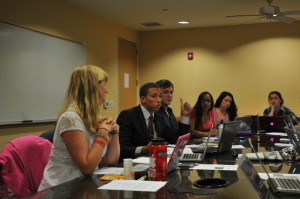
The 15th Undergraduate Senate passed a bill Tuesday night that could alter the makeup of the Senate in the future, as it decided to reserve three Senate seats for upperclassmen.
The approval of a constitutional amendment voted on by the student body last spring forced the Senate to pass a bill addressing the lack of upperclassmen representatives in the students’ governing body.
With the passage of the bill, which will take effect in time for elections this spring, the three upperclassmen receiving the most votes will earn a seat on the Senate, provided they receive at least two-thirds of the votes that the thirteenth place candidate received.
“I think this will help in getting upperclassmen to run,” said Senate Chair Ben Holston ’15.
Some senators expressed their opposition to the amendment approved by the student body, but noted it was their duty to pass a bill fulfilling the student body’s wishes.
“I had hesitations last year about the approval of an upperclassmen quota, but I think this bill is a good compromise of preventing certain upperclassmen of taking advantage of the amendment to make a mockery of the ASSU,” Senator Zane Hellmann ’16 said.
Several senators said that the bill did not address the bigger issue of why upperclassmen are not running in the first place, with many citing the restriction against senators serving while studying abroad as a reason for fewer upperclassmen running for senate.
“I did not vote for this bill because it does not address the base problem, which is that upperclassmen are not running for Senate,” Senator Ryan Matsumoto ’16 said.
Holston noted that the Senate would continue its discussion about the study-abroad restriction, with a vote on the bill regarding the restriction potentially occurring within the next two meetings.
The Senate also made other preparations for the upcoming spring elections including the confirmation of members for the Elections Commission, the committee that oversees the election process.
The Senate also heard proposals for Senate Innovation Funds from two student organizations.
A group of students, known as Maker’s Space, sought money to create a unified space for creative activities, proposing to turn unused space in the second floor of Meyer Library into an area for artists, filmmakers, photographers and designers.
Stanford Student Space Initiative sought funds to continue several of their projects, including the launching of space balloons.
In addition, the Senate passed $19,566.27 in funding bills.
Contact Andrew Vogeley at avogeley ‘at’ stanford ‘dot’ edu.
